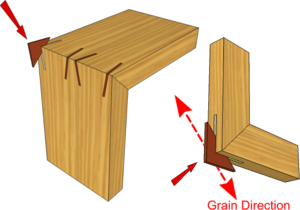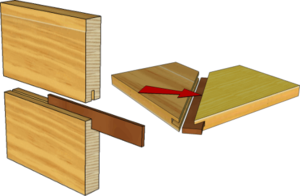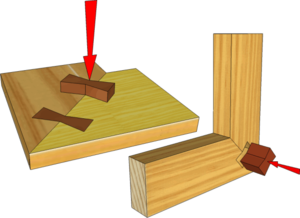Keys, Tongues and Slip Feathers
From DT Online
In Cabinet Making, and other forms of fine woodworking, Keys, Tongues and Slip Feathers are terms used (sometimes interchangeably) to describe small pieces of material (usually wood) which are used to strengthen a joint. they can also be used to create a decorative effect if a contrasting colour material is used.
Note: Keys, Tongues and Slips are also terms used in Engineering to describe small pieces of metal used to locate components.

Veneer Keys
Small pieces of Veneer (or Feathers) can be glued into saw cuts made across a joint to provide additional strength. Note the direction of grain on the Veneer to ensure maximum strength.
If a contrasting wood veneer is used and/or the directions of the saw cuts varied, some interesting decorative effects can be created.
Loose Tongues

Thin strips (or Slips) of Ply, timber or other materials can be inserted into a Groove cut into each joining face to form a Loose Tongue which completes the joint.
If the strip is made from timber, its grain should run across the joint (i.e. in the direction of the arrow) to achieve maximum strength.

Shaped Keys and Tongues
Small pieces of contrasting wood or other materials can be shaped and inserted into matching recesses to produce bold decoration in addition to adding substantial strength to the joint .